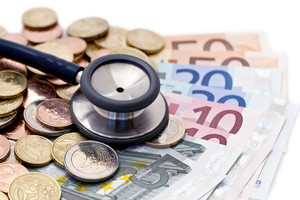As governments around the world try to rein in healthcare expenses, generics and biosimilars can play a major role in reducing this budgetary burden [1, 2].
Competition
Effective competition between originator drugs and between originator and generic drugs generates incentives for originator pharmaceutical companies to continue investing in research and development.
Budget constraints
Due to the so-called ‘patent cliff’, a large number of key small molecule brand-name drugs become open to competition from generics. This has enabled many governments to make major savings by the replacement of expensive brand-name drugs with low cost generics. Reference price systems and/or the pricing of generics in a cluster (‘generic price link’) have also contributed to savings.
Promotional measures for generics, such as making prescribing by international non-proprietary name mandatory and the use of public awareness-raising campaigns, have been frequently used to increase the uptake of generics.
Despite these measures, spending on drugs accounts for a considerable percentage of total healthcare spending in Europe. In 2011, spending on drugs as a percentage of total healthcare spending range from 6.8% in Denmark to 33.4% in Hungary; followed by Greece (28.5%) and the Slovak Republic (27.4%) in 2011.
European Union measures
The European Union (EU) has introduced several measures such as centralized procedure for the authorization of medicines and rules facilitating the approval of generics in order to promote innovation while assuring timely access of patients to medicines.
Biosimilars
Experience to date suggests that the most important conditions for market uptake of biosimilars are driven by factors such as:
1. physician perception
2. patient acceptance
3. local pricing and reimbursement regulations
4. procurement policies and terms.
Increasing uptake of biosimilars can contribute to the objectives of improving overall public health and the sustainability of Member States’ healthcare systems.
According to IMS Health, although biosimilars are a small segment in the total pharmaceutical market (~1%), they have an exceptional growth (38% in 2012). Biosimilars’ share of the accessible European market has grown steadily from their launch and is now at 18%. Biosimilars have a 13% share of growth hormone market, 19% of the erythropoietin market and 49% of the granulocyte colony-stimulating factor market. The per capita uptake of biosimilars and the size of the accessible market however differ between European markets [3].
Continued effort
Member States’ governments will need to continue their efforts to contain future growth in medical expenditures, notably for medicines. The use of generics and biosimilars as lower cost alternatives is therefore expected to be promoted by public and private payers. However, lack of competition and insufficient or ineffective policies promoting the use of generics and biosimilars can work against governments trying to implement budgetary savings.
Editor’s comment
Readers interested to learn more about drug savings in healthcare systems are invited to visit www.gabi-journal.net to view the following manuscript planned in GaBI Journal 2012, Issue 3-4:
Saving money in the European healthcare systems with biosimilars
If you are interested in contributing a research or perspective paper in a similar area to GaBI Journal, please send us your submission here.
Related Article
Generics save US 1.5 trillion over last 10 years
References
1. Commission staff working document. Pharmaceutical industry: a strategic sector for the European Economy. 1 August 2014. SWD(2014) 216 final/2.
2. Derbyshire M. Reducing the European healthcare budget with generics and biosimilars. Generics and Biosimilars Initiative Journal (GaBI Journal). 2014;3(4):200-1. doi:10.5639/gabij.2014.0304.046
3. GaBI Online - Generics and Biosimilars Initiative. Use of biosimilars in Europe [www.gabionline.net]. Mol, Belgium: Pro Pharma Communications International; [cited 2014 Oct 17]. Available from: www.gabionline.net/Reports/Use-of-biosimilars-in-Europe
Permission granted to reproduce for personal and non-commercial use only. All other reproduction, copy or reprinting of all or part of any ‘Content’ found on this website is strictly prohibited without the prior consent of the publisher. Contact the publisher to obtain permission before redistributing.
Copyright – Unless otherwise stated all contents of this website are © 2014 Pro PharmaCommunications International. All Rights Reserved.








 0
0











Post your comment